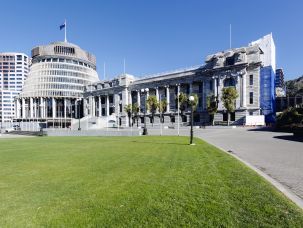Parliament has given a third reading to the Statutes Repeal Bill, repealing 127 redundant pieces of legislation and parts of another nine statutes. The repealing legislation comes into force shortly, on the day it receives the Royal assent.
When introducing the bill, then Regulatory Reform Minister Steven Joyce said it meant that the number of public Acts in force in New Zealand would reduce by over 10%.

The oldest statute to be repealed is The Liverpool and London and Globe Insurance Company Act 1879, a Private Act changing the name of an insurance company and giving it corporate identity.
The most recent statute is the Rugby World Cup 2011 (Empowering) Act 2010, which made itself expire on 4 December 2014, but which remains as a piece of legislation in force. Not for much longer.
A high proportion - 49% - of the statutes are entitled "Finance Act". A lot of these are evidence of a more tightly regulated economy than now. The Finance Act 1956, for instance, generously allows salary increases for civil servants as long as they don't exceed £410 a year.
The Finance Act 1962 permits the Hop Marketing Committee to blow up to £100 a year in unauthorised expenditure.
Repealing some interesting historical markers
Others are remnants of interesting historical events, and their repeal - while quite sensible and practical - will make the record of some once much-discussed matters harder to find.
The soon-to-be repealed Public Safety Conservation Act Repeal Act 1987 itself repealed the once infamous Public Safety Conservation Act 1932. This was passed in the Depression and gave the Cabinet the power to proclaim a state of emergency and make any regulations necessary to prohibit acts that it believed could compromise public safety.
This incredible power was first used at the outbreak of World War II (check out the Alien Control Emergency Regulations 1939 and the Proclamation of Emergency 1939), and it was also used during the 1951 waterfront industrial dispute (the Waterfront Strike Emergency Regulations 1951 established - without Parliamentary debate - some very draconian offences).

The intriguingly-named Michael Connelly Appointment Validation Act 1936 allowed Mr Connelly's appointment to the Legislative Council to go ahead after it was discovered he was a technically a civil servant (and therefore ineligible). Mr Connelly (who died in 1970 aged 83) was a trade unionist, Labour politician and worked for the railways (making him a civil servant) when the new Labour Government tried to appoint him to the Legislative Council. Following the special piece of legislation he remained a Council member until the new National Government did not reappoint him in 1950. The Council was abolished for good on 1 December 1950.
The Hawke's Bay Earthquake Act 1931 is an interesting record of the legislative response to a devastating earthquake 80 years before the Canterbury earthquakes. This included the establishment of an "Adjustment Court" which had the power to make declarations of the rights or liabilities of anyone in respect of property or personal rights.
The Local Restoration Polls Act 1990 is a relic of the now-forgotten days when the sale of alcohol in certain electorates - by 1990, just Roskill, Wellington East, Grey Lynn, Eden and the Tawa special district - was prohibited. The 1990 Act gave electors in those places the chance to vote out prohibition.
The Customs Law Act 1908 contained 303 separate sections when enacted; now just four remain alive (one of which is the short title). One of the remaining provisions - section 205 - gives the Governor-General the power to place restrictions on the ships of any country which dares to restrict "British trade and navigation". The section has effectively been repealed out of any meaningful existence, as it relies on actions taken under the Shipping and Seamen Act 1952, which was repealed in February 1995.
From a legal history point of view, the soon-to-be-gone Consolidated Statutes Enactment Act 1908 was one of the most important pieces of legislation passed. It marked the end of the (at the time) enormous task (commenced in 1895) of preparing a revised and consolidated version of New Zealand's law - 208 statutes, all with "1908" in their title formed our law after this Act came into force (being the 209th). There has never been another similar consolidation, although recent efforts by the Parliamentary Counsel Office and Attorney-General mean New Zealanders now have access to up-to-date and consolidated electronic legislation.

The bill will also finally dispose of the Sentencing Council, which has been waiting in the wings through the Sentencing Council Act 2007. Passed under the last Labour Government, this was opposed by the soon-to-be-in-power National Party, which decided to scrap it and put the money allocated into funding for services for victims. The Act has lingered on, but a Sentencing Council never eventuated. Labour and Green party members of the Government Administration Committee which considered the Statutes Repeal Bill questioned whether it might not have been more appropriate to repeal the Sentencing Council Act with a separate bill.
The nine statutes which have been partially repealed are the Administration of Community Sentences and Orders Act 2013, Fishieries Act 1996, Government Superannuation Fund Amendment Act (No 2) 1990, Medicines Amendment Act 2013, Parole Amendment Act 2007, Sentencing Amendment Act 2007, Sport and Recreation New Zealand Act 2002, State Sector Act 1988, and the Wellington City Reserves Act 1871.
Statutes repealed by the Statutes Repeal Bill
- Auckland Harbour Bridge Authority Dissolution Act 1983 (1983 No 153)
- Children’s Health Camps Board Dissolution Act 1999 (1999 No 141)
- Christchurch–Lyttelton Road Tunnel Authority Dissolution Act 1978 (1978 No 51)
- Church Property Trust (Canterbury) Amendment Act 1951 (1951 No 4 (P))
- Church Property Trustees (Canterbury) Indemnity Act 1890 (1890 No 2 (P))
- Consolidated Statutes Enactment Act 1908 (1908 No 4)
- Consumer Council Act Repeal Act 1988 (1988 No 144)
- Counties Insurance Empowering Act 1941 (1941 No 6)
- Customs Law Act 1908 (1908 No 36)
- Education Law Amendment Act 1933 (1933 No 37)
- Farm and Fishing Vessel Ownership Savings Schemes (Closure) Act 1998 (1998 No 22)
- Farm Ownership Savings Act 1974 (1974 No 45)
- Finance Act 1930 (No 2) (1930 No 40)
- Finance Act 1931 (No 2) (1931 No 5)
- Finance Act 1931 (No 4) (1931 No 44)
- Finance Act 1932 (1932 No 11)
- Finance Act 1933 (1933 No 33)
- Finance Act 1933 (No 2) (1933 No 41)
- Finance Act (No 2) 1935 (1935 No 41)
- Finance Act (No 2) 1939 (1939 No 38)
- Finance Act (No 2) 1940 (1940 No 19)
- Finance Act (No 3) 1940 (1940 No 26)
- Finance Act 1941 (1941 No 4)
- Finance Act (No 2) 1941 (1941 No 27)
- Finance Act (No 2) 1942 (1942 No 14)
- Finance Act 1945 (1945 No 2)
- Finance Act (No 2) 1945 (1945 No 45)
- Finance Act 1946 (1946 No 16)
- Finance Act (No 2) 1946 (1946 No 41)
- Finance Act 1947 (1947 No 6)
- Finance Act (No 2) 1947 (1947 No 45)
- Finance Act 1948 (1948 No 35)
- Finance Act (No 2) 1948 (1948 No 78)
- Finance Act 1949 (1949 No 39)
- Finance Act (No 2) 1949 (1949 No 52)
- Finance Act 1951 (1951 No 78)
- Finance Act 1952 (1952 No 57)
- Finance Act (No 2) 1952 (1952 No 81)
- Finance Act (No 2) 1953 (1953 No 115)
- Finance Act 1954 (1954 No 90)
- Finance Act 1955 (1955 No 8)
- Finance Act 1956 (1956 No 51)
- Finance Act 1957 (1957 No 106)
- Finance Act 1958 (1958 No 38)
- Finance Act 1959 (1959 No 96)
- Finance Act 1960 (1960 No 114)
- Finance Act 1961 (1961 No 120)
- Finance Act 1962 (1962 No 131)
- Finance Act 1963 (1963 No 127)
- Finance Act 1964 (1964 No 6)
- Finance Act (No 2) 1967 (1967 No 159)
- Finance Act 1968 (1968 No 54)
- Finance Act 1969 (1969 No 132)
- Finance Act 1971 (1971 No 55)
- Finance Act 1972 (1972 No 19)
- Finance Act 1973 (1973 No 41)
- Finance Act 1975 (1975 No 133)
- Finance Act 1977 (1977 No 75)
- Finance Act 1980 (1980 No 47)
- Finance Act 1981 (1981 No 4)
- Finance Act (No 2) 1981 (1981 No 110)
- Finance Act 1982 (1982 No 122)
- Finance Act 1983 (1983 No 59)
- Finance Act 1986 (1986 No 134)
- Finance Act 1987 (1987 No 200)
- Finance Act (No 2) 1988 (1988 No 128)
- Finance Act 1989 (1989 No 13)
- Finance Act (No 2) 1989 (1989 No 51)
- Finance Act (No 2) 1990 Amendment Act 1997 (1997 No 73)
- Finance Act (No 3) 1990 (1990 No 115)
- Finance Act 1991 (1991 No 93)
- Finance Act 1993 (1993 No 49)
- Finance Act (No 2) 1994 (1994 No 134)
- Fishing Vessel Ownership Savings Act 1977 (1977 No 62)
- Forests Amendment Act 1996 (1996 No 25)
- Hawke’s Bay Earthquake Act 1931 (1931 No 6)
- Hawke’s Bay Earthquake Relief Funds Act 1931 (1931 No 29)
- Hutt Road Act 1939 (1939 No 18)
- Infants Act Repeal Act 1989 (1989 No 145)
- Labour Department Act Repeal Act 1989 (1989 No 82)
- Licensing Fund Act 1989 (1989 No 61)
- Liverpool and London and Globe Insurance Company Act 1879 (1879 No 5 (P))
- Local Authority Reorganisation (Property Transfers) Act 1990 (1990 No 54)
- Local Restoration Polls Act 1990 (1990 No 4)
- Marine and Power Engineers’ Institute Industrial Disputes Act 1974 (1974 No 28)
- Mental Hospitals Reserves Act 1908 (1908 No 257)
- Michael Connelly Appointment Validation Act 1936 (1936 No 1 (P))
- Ministry of Economic Development Act 2000 (2000 No 28)
- Mortgagors and Lessees Rehabilitation Act 1936 (1936 No 33)
- Mount Albert Licensing Trust Dissolution Act 1986 (1986 No 9)
- Municipal Insurance Act 1960 (1960 No 29)
- National Development Act Repeal Act 1986 (1986 No 122)
- National Expenditure Adjustment Act 1932 (1932 No 8)
- New Zealand Council for Postgraduate Medical Education Act Repeal Act 1990 (1990 No 10)
- New Zealand Export-Import Corporation Dissolution Act 1992 (1992 No 23)
- New Zealand National Airways Corporation Dissolution Act 1978 (1978 No 48)
- New Zealand Stock Exchange Restructuring Act 2002 (2002 No 1 (P))
- Okarito Harbour Act 1932–33 (1932 No 39)
- Phoenix Assurance Company of London Act 1887 (1887 No 2 (P))
- Post Office Act Repeal Act 1987 (1987 No 115)
- Public Safety Conservation Act Repeal Act 1987 (1987 No 181)
- Public Service Investment Society Management Act (No 2) 1979 (1979 No 9)
- Rent Restriction Act 1924 (1924 No 3)
- Rent Restriction Extension Act 1931 (1931 No 11)
- Royal New Zealand Institute of Horticulture Act 1953 (1953 No 20)
- Rugby World Cup 2011 (Empowering) Act 2010 (2010 No 123)
- Seamen’s Union Funds Act 1971 (1971 No 71)
- Sentencing Council Act 2007 (2007 No 25)
- Southland Electricity Act 1993 (1993 No 147)
- Southland Flood Relief Committee Empowering Act 1992 (1992 No 1 (P))
- State Insurance Act 1990 (1990 No 36)
- State Sector Amendment Act (No 2) 2004 (2004 No 114)
- Statutes Amendment Act 1943 (1943 No 20)
- Statutes Amendment Act 1944 (1944 No 25)
- Statutes Repeal Act 1907 (1907 No 40)
- Sydenham Money Club Act 2001 (2001 No 2 (P))
- Taranaki Harbours Act 1965 (1965 No 4)
- Taxation Acts Repeal Act 1986 (1986 No 48)
- Terralink NZ Limited (Transfer of Employees) Act 1996 (1996 No 52)
- Tobacco Growing Industry Repeal Act 1987 (1987 No 6)
- Tourist Hotel Corporation of New Zealand Act 1989 (1989 No 130)
- Trade and Industry Act Repeal Act 1988 (1988 No 156)
- Waimakariri - Ashley Water Supply Act 1961 (1961 No 131)
- Waterfront Industry Reform Act 1989 (1989 No 6)
- Waterfront Industry Restructuring Act 1989 (1989 No 66)
- Wellington City Reserves Act 1872 (1872 No 13)
- Wheat Board Amendment Act 1986 (1986 No 25)
- Year 2000 Information Disclosure Act 1999 (1999 No 25)
